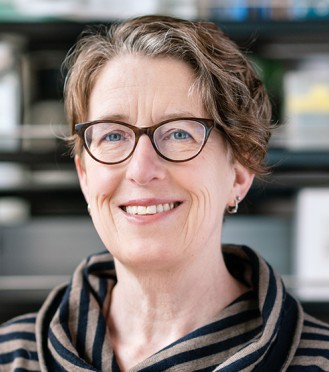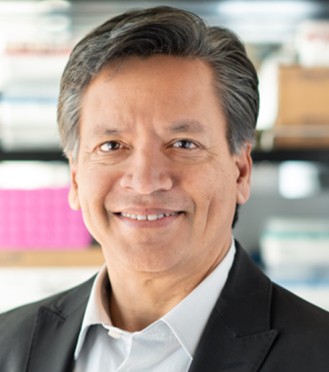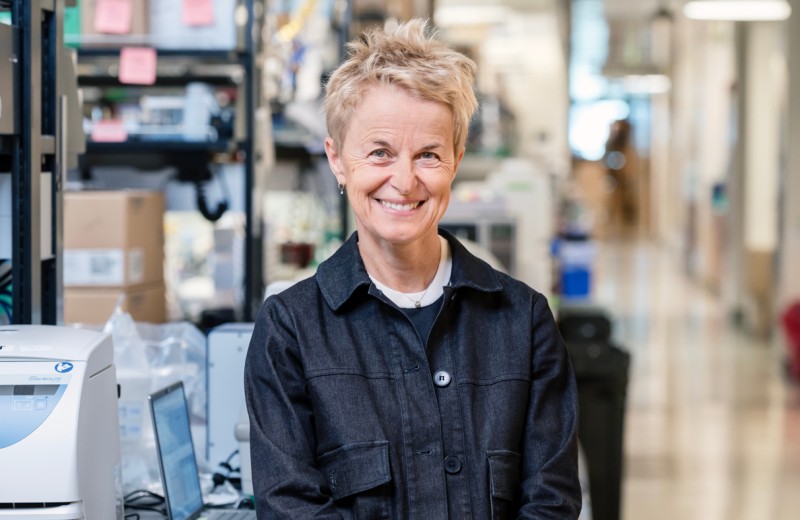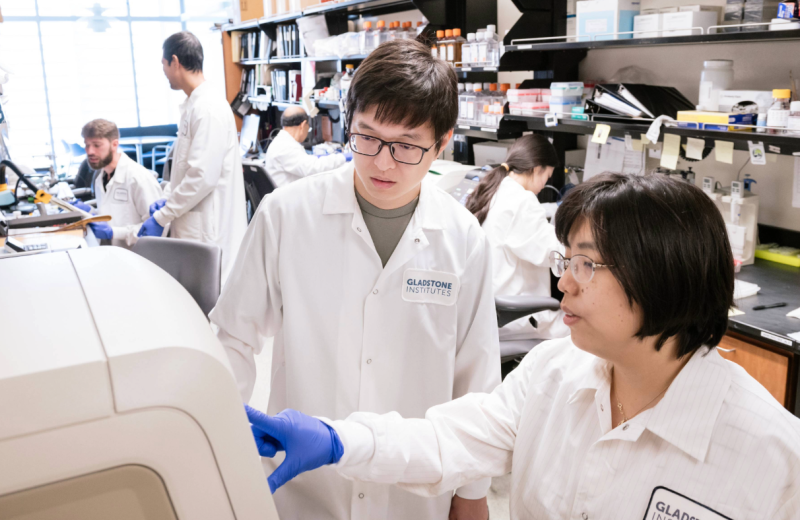Gladstone NOW: The Campaign Join Us on the Journey✕
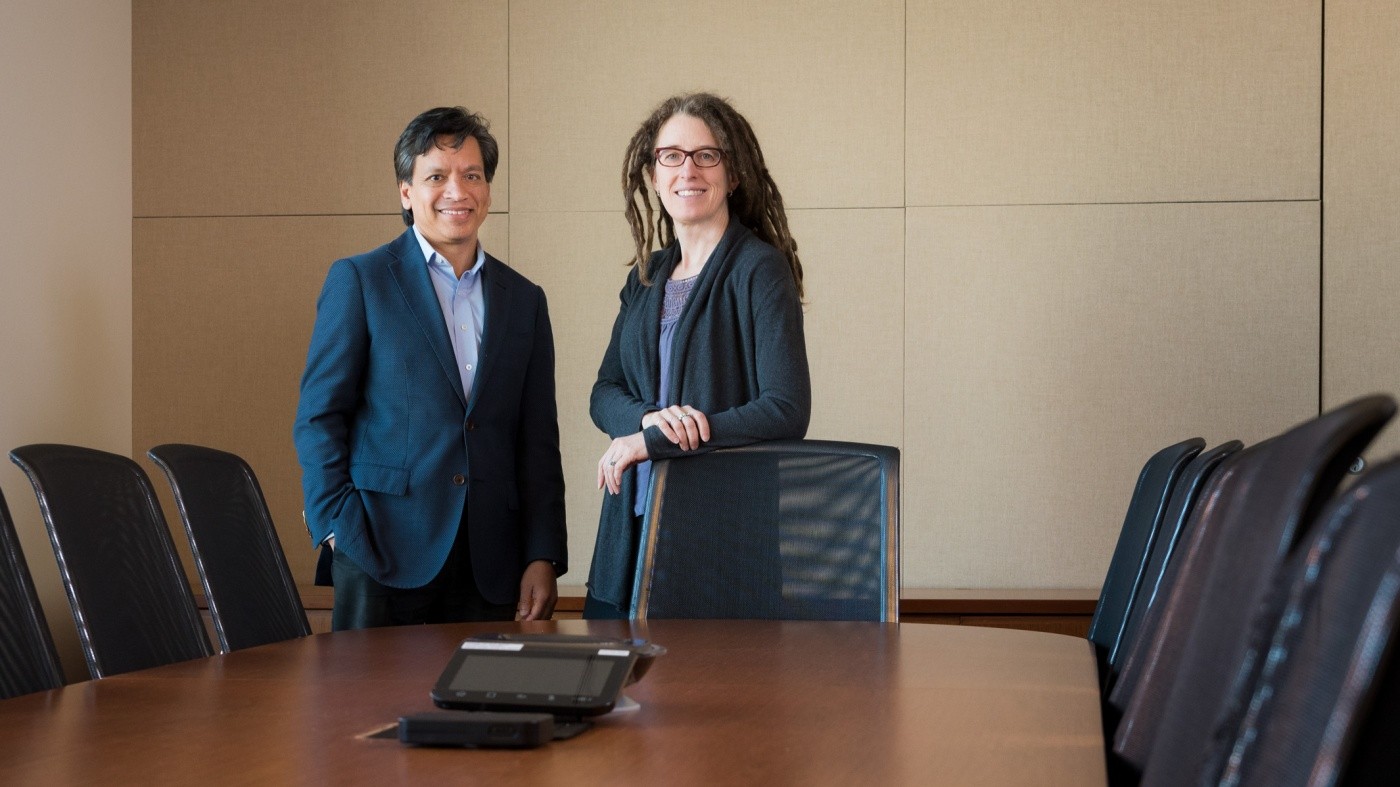
Deepak Srivastava (left) and Katherine Pollard (right) announce the new Institute of Data Science and Biotechnology. [Photo: Chris Goodfellow]
Science is becoming increasingly driven by advanced technologies that are fundamentally changing the way research is conducted. But too often, the experts developing the technologies and the scientists interpreting the data these technologies produce are separated in different university departments, organizations, or even industries.
To create a central hub where mathematicians, engineers, and biologists can work closely together, the Gladstone Institutes is launching the new Institute of Data Science and Biotechnology. The institute will increase collaboration between those who develop and those who use biomedical technologies among Gladstone and its partners in San Francisco’s Mission Bay neighborhood, including UC San Francisco (UCSF) and the Chan Zuckerberg Biohub, and throughout the Bay Area.
This new institute will also address a common bottleneck in modern research: analyzing and understanding large amounts of information. Emerging technologies allow researchers to collect more data than they could have imagined even a few years ago. But making sense of it isn’t necessarily an easy task.
“Traditionally, academics have made software that mostly works, but isn’t particularly fast or robust,” said Katherine Pollard, PhD, director of the new institute. “Given our location, so close to Silicon Valley, we want to leverage our existing partnerships and recruit other experts to engineer more powerful solutions that can help scientists analyze the data they gather and, ultimately, find new ways to treat disease.”
With her extensive experience in bioinformatics, machine learning, and computational biology, Pollard is ideally suited to lead the new institute.
“We are excited that Katie has accepted to guide the development of novel platforms and approaches at Gladstone,” said Deepak Srivastava, MD, president of Gladstone. “Her creative and collaborative vision for this institute will undoubtedly drive groundbreaking science.”
New Technology to Read and Write the Code
Scientists today are getting closer to reading and writing the code of life. To do so, they need machines to collect data, computational methods to understand it, and techniques to apply their knowledge in order to unravel the mechanisms of disease.
The mission of the new institute is to accelerate discoveries by including data scientists in technology development and research from the beginning to the end of the scientific process, rather than as a final step when opportunities for new insights have already been missed.
“Our motivation is to develop cutting-edge tools so that we can read and write the code in ways that are currently not possible,” said Srivastava, who is also a senior investigator at Gladstone and a professor at UCSF. “As it becomes easier to acquire more and more data, it’s critical that we rely on a team-based and collaborative approach to ensure we get the most out of the data we have.”
The new institute represents an evolution of the former Convergence Zone at Gladstone. In addition to the current bioinformatics and proteomics facilities, Pollard, along with colleague Nevan Krogan, PhD, aims to bring in new methods to collect and analyze data.
“We’re interested in hiring people and building machines to measure and manipulate biological systems in novel ways,” said Pollard, who is also a professor at UCSF and a Chan Zuckerberg Biohub investigator. “This can include metabolomics to study chemical processes in the body, high-resolution imaging to observe single cells in 3D, or cryogenic electron microscopy to look at ‘frozen’ molecules and decode function from structure.”
With infrastructure in place to collect rich datasets, the information will need to be analyzed through bioinformatics, statistics, and artificial intelligence. These computational technologies can highlight unknown correlations between different elements and provide predictions that can narrow the scope of a study or point to a new hypothesis.
For instance, patients with a certain disease will have hundreds of genetic mutations. Yet, it’s difficult to know which ones actually cause the disease. With innovations in proteomics and computational approaches, scientists can narrow the list down to a handful of mutations and make it much easier to test in the laboratory or clinic. The teams led by Pollard, Krogan, and Srivastava have teamed up with others at Gladstone to tackle this problem for congenital heart defects. They hope to learn more about the cause of the disease and potential avenues for therapeutic intervention.
Finally, Pollard wants to close the loop by incorporating code-writing approaches, such as genome editing using CRISPR-based approaches and synthetic biology, which are needed to test and validate hypotheses and could also provide novel therapies.
“As the technology to generate massive datasets continues to advance, data science is becoming the ever-increasing bottleneck,” said Joe Derisi, PhD, professor at UCSF and co-president of the Chan Zuckerberg Biohub. “The Institute of Data Science and Biotechnology will help directly address this bottleneck, and I can think of no other person better suited to run this new endeavor than Dr. Pollard.”
Technologists Driving Science
The Institute of Data Science and Biotechnology is becoming Gladstone’s fourth institute, and the first to be created since 1998. The other three focus on specific research or disease areas: the Gladstone Institute of Cardiovascular Disease, the Gladstone Institute of Immunology and Virology, and the Gladstone Institute of Neurological Disease.
“The main goal of the new institute is to develop technologies that will be useful across all disease areas researched at Gladstone,” said Srivastava. “We will recruit experts who will focus on creating a technology and then deploy it collaboratively toward many different scientific problems.”
This institute represents a unique way of bringing together developers and scientists in close collaboration. Data integration and analysis is so important, but it is only effective if the analysis pipeline is designed with knowledge of how data-collecting machines work. And the reverse is also true. Technologists must understand data science and biology to develop tools that can be purposeful and drive research forward.
“It’s helpful to have a common place for the people developing platforms, but it’s rare that you’ll find them working so closely with data scientists and users of their technologies,” said Pollard. “With our model, technologists can be involved from the beginning and help set up experiments for success, and biologists can help orient the development of the technology they rely on. We believe this will create synergy and lead to more productive science and faster results.”
For Media
Julie Langelier
Associate Director, Communications
415.734.5000
Email
About Gladstone Institutes
Gladstone Institutes is an independent, nonprofit life science research organization that uses visionary science and technology to overcome disease. Established in 1979, it is located in the epicenter of biomedical and technological innovation, in the Mission Bay neighborhood of San Francisco. Gladstone has created a research model that disrupts how science is done, funds big ideas, and attracts the brightest minds.
Featured Experts
Support Discovery Science
Your gift to Gladstone will allow our researchers to pursue high-quality science, focus on disease, and train the next generation of scientific thought leaders.
One Person’s Final Gift to Science Gets Us Closer to an HIV Cure
One Person’s Final Gift to Science Gets Us Closer to an HIV Cure
A new documentary follows Jim Dunn’s end-of-life decision to donate his tissues to HIV research.
Institutional News HIV/AIDS Infectious Disease Roan LabBeyond Viruses: Expanding the Fight Against Infectious Diseases
Beyond Viruses: Expanding the Fight Against Infectious Diseases
The newly renamed Gladstone Infectious Disease Institute broadens its mission to address global health threats ranging from antibiotic resistance to infections that cause chronic diseases.
Institutional News News Release Cancer COVID-19 Hepatitis C HIV/AIDS Zika Virus Infectious DiseaseFueling Discovery at the Frontiers of Neuroscience: The NOMIS-Gladstone Fellowship Program
Fueling Discovery at the Frontiers of Neuroscience: The NOMIS-Gladstone Fellowship Program
The NOMIS-Gladstone Fellowship Program empowers early-career scientists to push the boundaries of neuroscience and unlock the brain’s deepest mysteries.
Institutional News Neurological Disease Mucke Lab NOMIS

